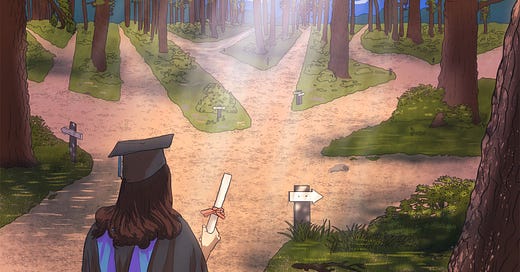You can listen to a professional narration of this article below:
Embrace Good Problems: Advice to Young People Today
I don't know when I graduated to giving job-seeking advice. However, I know that my scribbles are read by a lot of students and their parents, so I thought I would share this with you.
A 22-year-old daughter of a friend, for the first time in her life, has hit a brick wall. She just graduated from Tulane University and trying to find a job in public health policy. Over the last three months, she has had dozens of interviews and has made it to the final round in a few of them but has not been successful in landing a position.
Up to this point she has not encountered many obstacles in her life. She comes from a well-to-do, loving family. She was a school senator at one of the largest high schools in Denver. She sailed through high school and Tulane University with perfect grades.
She is understandably upset about this. I told her that, as frustrating as her life may seem right now, she is having a good problem; and happiness in life comes from having good problems. Finding a job that you love is a great problem.
Think about how much worse things could have been in your life, I might have added. You live in a peaceful time, you are young and healthy, and your whole life is ahead of you. If it takes you a few months longer to find a job, nothing will really change in your life. You won't starve, and you'll have a place to live. (Stoics call this exercise negative visualization.)
If you put in enough effort, I might have assured her, you'll find the job of your dreams. Until now, you’ve lived in a sheltered environment governed by the laws of linearity. You studied hard and, as a result, you earned good grades – a linear outcome. Until now, you could observe a direct connection between input (hard work) and output (good grades). This doesn't always happen in the real world – it’s complex. Hard work doesn't always lead to the expected outcome, but fighting and not giving up will, more often than not, eventually lead to the desired result.
Yes, in this real, nonlinear world, luck plays a role. However, you don't want to rely on luck showing up on its own; you want to create your own luck.
Here is one example: Finding a job with IMA was a miracle for me. My family had moved to the US six years earlier and I did not have great control of the language yet. I wanted to be a stock analyst in a town that had few investment firms. I tried looking for a job in the traditional way, which resulted in some interviews but no job offers.
I made looking for a job a 10-hour-a-day job. I opened the Yellow Pages and faxed my resume to every single investment firm of any size in Denver. My resume arrived at IMA before they had even advertised a job. Was I lucky? Absolutely, but I created this luck through hard work and not doing what everyone else was doing. Create your own luck; reduce your competition by finding a more novel way. I got the job at IMA because I had very little competition.
Right now, I could have told her, you need to have small victories. These can come from little things like having a clean room, doing a good workout, or going for a run.
In my book, I discuss the Stoic concept of dichotomy of control. Despite appearances, most things in life are not under our control. We only have control over our values, our behavior, and how we respond to things. In the short term, you have little control over the outcome of getting a job, but you do have control over your process. That’s life. Focus on the process and keep improving and refining it. Keep showing up; you are a smart and hard-working young woman, so it is only a matter of time before you find a job you love.
I am very excited that you have a lot of good problems ahead of you.
(If you are reading this and looking for a smart, hard-working young woman to rock your world in public health policy in Denver, please drop me a line).
My book, Soul in The Game: The Art of a Meaningful Life, is now available in Russian on Kindle and in paperback.
You can download a selection of my best articles from 2022 as a beautifully produced PDF in this link.

Siloti and Bach’s Prelude in B Minor
This is a continuation of my series of articles about Alexander Siloti. (I have to warn you, this note is full of trite realizations.)
It took me a while to realize that some people are great at creating and some are terrific at editing the creations of others. Often creators are not good editors and editors are not good creators. Few are good at both. Tchaikovsky was a great creator but still needed the help of editors. He often relied on his friends to polish his wonderful masterpieces. I have mentioned that Siloti helped him with the piano parts in his piano concertos. Also, after Tchaikovsky’s death Siloti took it upon himself to “improve” Tchaikovsky’s piano concertos, making them even more Lisztonian.
We usually glorify creators, but editors are lost in the footnotes of history. However, editors may add a lot of value to original work and may even transform it.
I have not been able to find any original music by Siloti, but he had a great talent for “editing” (transcribing) the work of others. Let’s take Bach’s Prelude in B Minor. Silotti took Bach’s Prelude in E Minor, changed the key from E to B (made it a bit darker), tweaked a few things, and created a completely new, wonderful piece of music.
Maybe originality is overrated.
As I listen to Bach’s original version and Siloti’s transcription I see incredible beauty in both. Here is another revelation (I warned you): As I have gotten older, I have realized that I don’t have to like one thing more than another. I may find beauty in both. As trite as it sounds, this little discovery was liberating. Listen to both pieces and perhaps you’ll see what I mean.
Click here to listen.
Vitaliy Katsenelson is the CEO at IMA, a value investing firm in Denver. He has written two books on investing, which were published by John Wiley & Sons and have been translated into eight languages. Soul in the Game: The Art of a Meaningful Life (Harriman House, 2022) is his first non-investing book. You can get unpublished bonus chapters by forwarding your purchase receipt to bonus@soulinthegame.net.
Please read the following important disclosure here.






Love the way establish linkages … always a refreshing read !
Another issue Vitaliy is students should think about the demand for workers in their field. I graduated with an engineering degree in 1972...not a stellar time for engineering degrees but after sending out 476 resumes with my qualifications, I had 7 job offers! And I loved my satisfying 39 year career in oil and gas development around the world. Our kids need to consider what demand there will be for their job skills in the future, both as a student while earning a degree and ongoing skills and education they build as they progress in their chosen field of career work.